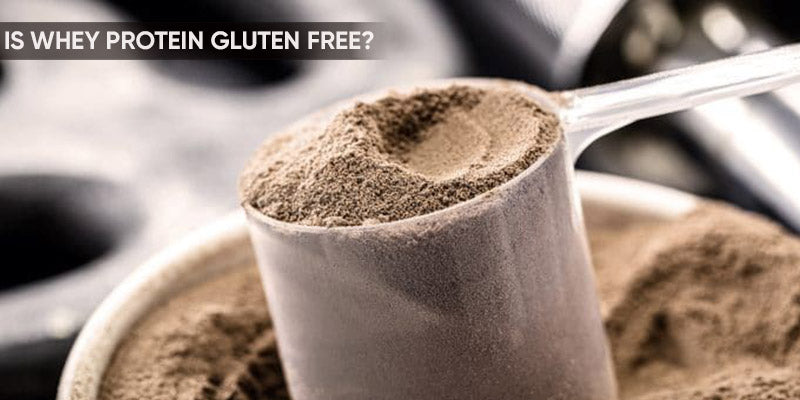Whey protein powder is a perennial favourite in the realm of health and fitness, loved by everyone from the die-hard bodybuilding community to the busy moms who need nutrition on the move. It can be used in a wide variety of recipes and is inexpensive, efficient, and simple to use and it tastes good too!
The subject of whether whey protein powder is a gluten-free food, however, is frequently overlooked by the vast majority of fitness enthusiasts. As you may anticipate, the answer is not a simple yes or no.
It's time to do a little research into whey protein to determine whether those who avoid gluten can safely consume this excellent supplement. We'll go over the fundamentals of whey, how to determine whether a products is gluten-free, and a summary of some other issues you should be aware of when you travel. Let's start now.
Bodybuilders, athletes, and fitness enthusiasts find whey protein to be an effective supplement. It is a complete protein that contains all nine essential amino acids and is easily digestible. However, many people who have gluten intolerance or celiac disease may wonder if whey protein is gluten-free. In this blog, we will explore the topic in detail.
What is Whey Protein?
The large 5-pound jugs and the upscale pouches are common in supplement stores and grocery stores, respectively. Even tiny individual serving samples may be distributed at gatherings or gyms. Whey protein is widely available, but what exactly is it?
Whey protein is a byproduct of the cheese-making process. It is the liquid part of milk that separates from the curd during the cheese-making process. Whey protein is a complete protein, meaning it contains all the essential amino acids required by the human body.
To review, along with carbohydrates and fat, protein is one of the "big three" macronutrients that make up the majority of our nutrition. It is in charge of healing our muscles after they have been damaged by exercise or simply going about our daily lives.
Furthermore essential for cellular activity, protein supports vital bodily processes like immunity and metabolism. Without it, we cannot survive! That's why, especially if we're active, doctors advise that we consume 0.8g of protein for every pound of body weight each day.
Nevertheless, if you quickly calculate the amount of protein needed, you'll see that it's considerably higher than what the typical diet offers. Much of our diet is high in carbohydrates, and protein-rich foods are harder to find for quick and simple snacks.
This is where whey protein powder comes in. It's a quick-to-prepare product. Whey protein can assist grow and maintain muscle mass while lowering fat mass. It is most frequently found in whey protein powder form, and drinks or snacks made with it can do this.
Around 80% of the protein in milk is made up of whey, a naturally occurring substance found in cow's milk; casein makes up the remaining 20%. While manufacturing dairy products like cheese, curds, and yoghurt, whey separates from the rest of the milk and is later ground into a powder. Whey concentrate is given flavors like strawberry, strawberry vanilla, and chocolate to make it more appealing.
Whey protein concentrates are among the best quality foods available, and they also have the convenience factor and delectable flavors. They contain many of the important amino acids required for healthy skin, hormones, and neurotransmitters.
Is Whey Protein Gluten-Free?
Whey protein is naturally gluten-free, but some whey protein supplements may contain gluten. This is because some manufacturers add flavorings and other ingredients to their whey protein products that may contain gluten. Therefore, it is essential to read the label carefully before purchasing any whey protein product.
Although whey protein has some obvious benefits, if you're trying to avoid gluten or have a gluten sensitivity, you'll want to know if it's actually safe to consume.
Let's start with the happy news: the majority of premium pure whey protein supplements are in fact gluten-free, so you can drink your shakes without risk.
But, some of the less expensive whey protein powders in the market may cause issues, so there are a certain things to check for before making a purchase.
Make it a point to look for the official gluten-free label on a whey protein product's jug or packet while inspecting it in person or online. If you've been following a gluten-free diet for a while, you'll recognize the "GF" emblem.
When choosing whey, those who have celiac disease or very severe gluten intolerance should be even more cautious and check for the Gluten-Free Certification Organization's seal of approval (GFCO). This guarantees that the product's gluten content will not exceed 10 parts per million, which is twice as rigorous as the current legal limit.
If you have questions concerning potential problems with the whey production process, such as cross-contamination, it might be wise to get in touch with the manufacturer. Go with a manufacturer who takes gluten-free seriously to avoid taking any additional chances.
How to Choose Gluten-Free Whey Protein?
If you are gluten intolerant or have celiac disease, it is crucial to choose a whey protein product that is labeled gluten-free. Here are some tips to help you choose gluten-free whey protein:
- Read the Label: Always read the label before purchasing any whey protein product. Look for products that are labeled gluten-free or do not contain any gluten ingredients.
- Check the Ingredients: Check the list of ingredients carefully. Avoid products that contain wheat, barley, rye, or any other gluten-containing ingredients.
- Look for Third-Party Certification: Look for products that have been certified gluten-free by a reputable third-party organization such as the Gluten-Free Certification Organization (GFCO).
- Research the Brand: Do some research on the brand before purchasing their whey protein product. Look for reviews and feedback from other customers who have a gluten intolerance or celiac disease.
Conclusion:
In conclusion, whey protein is naturally gluten-free, but some whey protein supplements may contain gluten. Therefore, it is crucial to read the label carefully before purchasing any whey protein product. If you have gluten intolerance or celiac disease, it is recommended to choose a whey protein product that is labeled gluten-free or has been certified gluten-free by a reputable third-party organization.


